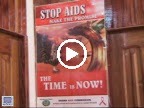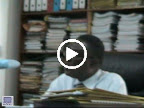 One of the major issues that President Sinkford and his companions have been in dialogue about during the Pilgrimage is the various responses to the HIV/AIDS epidemic in the countries we’ve visited. This morning we are on our way to Odumase in the Eastern Region of Ghana where the Manya Krobo people live. Since 2005 the UU United Nations Office has had a partnership with one of the schools for children who have been orphaned by the death of their parents from AIDS. While the transmission rates of HIV in Ghana are generally quite low as compared to other African countries (less than 2%) the rates in the Eastern region are considerably higher (9% down from a high of 19%), leading to a larger number of orphaned children in this area.
One of the major issues that President Sinkford and his companions have been in dialogue about during the Pilgrimage is the various responses to the HIV/AIDS epidemic in the countries we’ve visited. This morning we are on our way to Odumase in the Eastern Region of Ghana where the Manya Krobo people live. Since 2005 the UU United Nations Office has had a partnership with one of the schools for children who have been orphaned by the death of their parents from AIDS. While the transmission rates of HIV in Ghana are generally quite low as compared to other African countries (less than 2%) the rates in the Eastern region are considerably higher (9% down from a high of 19%), leading to a larger number of orphaned children in this area.
Millenium Development Goals Posters at UNICEF in Accra
Driving around

Examples of advertisements
Yesterday we met with leaders of 3 organizations involved in HIV/AIDS work in

HIV/AIDS discussion at UNICEF in Accra
For example, while the official Ghanaian operating philosophy is ABC (Abstinence, Being Faithful, and Condomizing), the school system (which approximately 70% of children participate in) teaches abstinence-only as a prevention strategy. However transmission and other information about HIV/AIDS is integrated into all aspects of the Curriculum (Mathematics, Science, etc.) through the ALERT program – which is organized by UNICEF. The decision to only include Abstinence as a preventive strategy in the school curriculum is due to cultural and religious constraints – not unlike those experienced in the

Discussion with Ghana AIDS Commission

Discussion with Ghana AIDS Commission
We recall that the HIV/AIDS work led by leaders of The Triangle Project in
The Ghana AIDS commission described the importance of the school in Odumase – which certainly applies to similar schools in countries throughout
The UU-UNO’s “Every Child is Our Child” partnership offers a straightforward way for American UUs to do something effective in response to the HIV/AIDS pandemic.




